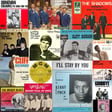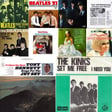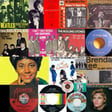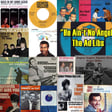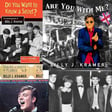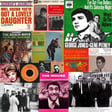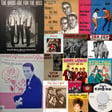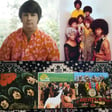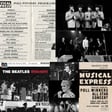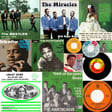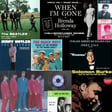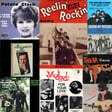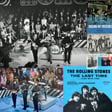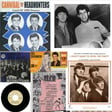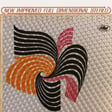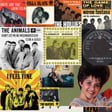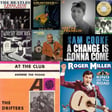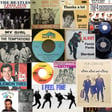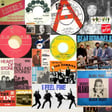Become a Creator today!Start creating today - Share your story with the world!
Start for free
00:00:00
00:00:01

December 1964 (side A)
Who wants to go on a Blind Date with George Harrison? Millions of girls for sure, but only Hayley Mills and the backpage of the Melody Maker accomplished the feat. Tune in for Twinkle (but not Little Star), Ken Dodd, Elvis, the CND and a little song that just might be "the first record to start with feedback". Support this podcast at the $6/month level on patreon to get extra content! Create your podcast today! #madeonzencastr
Recommended
Transcript
The Beatles' Mantra for Success
00:00:00
Speaker
the Beatles had this chant John Paul and George and probably then Stuart and Pete had this chant when things weren't going well which in their world wasn't very often because mostly it was an upward trajectory but nonetheless sometimes you know a bad night or the gig would you know didn't work properly or the amps broke or whatever I say where are we going fellas and they'd go to the top Johnny and I say where's that fellas and they say to the top of most of the Papa most I said right and we all sort of Cheer up.
00:00:31
Speaker
but we're going down he's straight to the top boy oh yeah where's that a chappermost of that pa
00:00:58
Speaker
Welcome to December 1964, Side A.
Introduction: Beatles Month and Feature Guests
00:01:02
Speaker
I'm Ed Chinn. I'm Kiddo Toole. And I'm Martin Quibbell. We are picking up our feature from last month. We are finishing up with the Beatle Month here on the back page. We covered Ringo and John's reviews with Paul. This month, we're going to be talking about the songs that George had on his blind date.
00:01:25
Speaker
And they are really interesting. And George has some fun with them. And we didn't have as much fun with all of them, maybe. No, we didn't. As with last month, we also played along for the songs that we weren't familiar with. I don't think we were familiar with any of the other ones. I mean, some of the ones we didn't review, we did have some coverage of.
George Harrison Reviews Pop Singles
00:01:47
Speaker
yes so it is another beetle in the hot seat to review pop singles in the blind date marv is going to start the first record george reviewed was earl royce in the olympics with k sera on columbia we also ran through this
00:02:47
Speaker
I got through about 25 seconds of it. to You guys got closer to the full 35 seconds we allotted. Yeah, I tried to give it a little more of ah of a listen and oh boy, and it was pretty corny. The backing wasn't too bad. It was kind of energetic, but there was one part of it that kind of ruined it for all of us. And Marv, why don't you tell everybody what that was? Guys, whistles in songs are not always a good thing. Please make sure that a trained professional uses them whenever you are going to use a whistle, because this is not a good whistle. All right, Marv, why don't you go ahead and tell us what George had to say about Earl Royce of the Olympics with Kei Sara.
00:03:39
Speaker
This is really interesting this. I didn't know about this. So he says, oh, yeah, queso ro. It's ah by a new group. George Martin is recorded. The lead voice is great, but the only thing about it I don't like is that the arrangements exactly the same as the original by the high keys. But as very few people will have heard the original, I suppose it's OK. This is a good record. It stands a chance.
00:04:04
Speaker
I prefer the trumpets in the original to this sound, but really generally, it's a nice sounding record and George Martin should be proud of them. I think he was being nice because of George Martin. ah How did George Martin let that police whistle get by? That's what I want to know. Exactly. It's shrill. It just wrecks it. I wonder if it was still stuck there from one of the comedy recordings is done with like a Bernard Cribbins or The Goons, maybe.
00:04:33
Speaker
Right on. It sounds like Right Said Fred. Oh, good point. But not as good. Right Said Fred is a great song. All right, Marv, move on to the second record, which we also covered.
Exploration of Francois Hardy's Sound
00:04:45
Speaker
Tell us what it is. Yes. Ekmem, Apologist to French People by Francois Hardy.
00:05:28
Speaker
I think all three of us actually enjoyed this song. A better wall of sound than Phil Spector gets most of the time in my opinion. Lovely arrangement in the background with the music and I liked Francois' voice as well.
00:05:42
Speaker
Yeah, I really liked the beginning. White wall sound, you know, kind of a big sound to it. The drums and I really thought this was an interesting record. And and as you said, well-range. This was probably the standout of the bunch we heard. And we've talked about Francois Hardy in the past. This is a good record. It's not great. I think you guys got basically all the way through the 35 seconds we allotted. I stopped just a little bit short of that, but not too much. It is a good record. I agree. And I think George agrees with what we had to say. Does he really? He says, it's a French one trying for a Phil Spector sound, apart from the voice, which I like because it's good and smoochy. It's an American sounding record and few Continental song songs. Wow, that's a tongue twister.
00:06:32
Speaker
mean all that much here. Quite nice, I imagine, if you're stoned out of your head at about 4am and you're fed up of noisy songs. You can get away with that in Melody Maker, but there's no way you'd get away with that on Jukebox Jewelry. yep It's a do-ron-ron sound and Andrew Holdham must be proud of her.
00:06:53
Speaker
Oh, it's an Andrew Luke Holden production, is it? Apparently so. So John is going to sit there listening to Fats all night long over and over, and George is going to listen to Francois Hardy all
Little Richard's 'Blueberry Hill' Reviewed
00:07:05
Speaker
night. We agree on the Phil Spector sound. We agree on, it is kind of a de do ron ron thing. Bet. Yeah, that's true. You've got three more.
00:07:14
Speaker
none of which we reviewed marv so you can go ahead and read through all of them okay next we've got sally by the vie counts not the same sally that uh that the police did many years later uh sally by the vie counts this is a british group isn't it well i doubt if it will do anything i never liked it even by gracie fields and she was my granny wow famous relatives hey george The sort of songs that The Bachelors should have done. I don't like it. And would you please take it off? Oh, we're back to taking it off again. They love that phrase, don't they? They do. Next, we've got Little Richard's version of ah Blueberry Hill, you know, the famous song by Fats. Fully enough. Speaking of Fats, Domino.
00:08:02
Speaker
He says, Richard's Blueberry Hill, a knock out, but it won't do a thing. Unfortunately I can imagine him rushing around the stage, smashing the mic to pieces while he's singing. I love the woo part, that's probably where we pinched our o thing from on stage. Tominyard is going to love that. yeah Well, it's nice to know. He's still doing rockers like these. I like it. But as Bama Lama didn't do much, and that was better than this, I can't see this doing much better than the bottom half of the pop 50. Yeah, I would agree. I like Richard's version, but it it doesn't beat Fats's. That's true. I agree, too.
00:08:43
Speaker
you know, you get the greatest artist in history and they'll still not beat Fats Domino's version of that song. Yep. Hard act to follow. That's right. And now on to the legend that is Al Martino. Legend of M.O.R. with the song We Could. And George says, oh, well done, George. I have no idea who it is. I don't like this sort of song. It sounds like someone trying to do a Dean Martin bit, but I don't like it. No, that's enough of that. Thank you. It's like he's doing Toppermost.
00:09:15
Speaker
Yeah, it kind of is. Well, I mean, that's what we said last month. Yeah. George also follows that. I mean, you know, the Beatles didn't have enough to do in the 60s. They could have done a podcast. We can bring back some microphones and some PCs. well Sure. On to the ones that I'm going to read. Next up, Rick Nelson's A Happy Guy. We've talked about Rick Nelson. We've talked about this song before.
00:09:39
Speaker
George says, Rick Nelson, I've always liked the sounds of his records and the backings are good. It has that usual easy moving beat. He hasn't had many hits in Britain, has he? Can't see this being a big hit. Bottom of the 50, maybe. It's quite nice. His guitarist is James Burton and he's marvelous on every Rick, Rick, Ricky Nelson record. So he's calling him Ricky. He's not calling him Rick. This one has a good bass and a good intro, but nothing else happens. No.
00:10:06
Speaker
It can't be a hit. This song's nothing. Yep. That's pretty much what we said when we reviewed it. So we're yeah on the same page as George. I didn't know that was James Burton on the guitar. Yeah. Now the next song that we played along with George, the Pathfinders, I Love You Caroline,
00:11:03
Speaker
i got about 20 seconds in yeah you actually went past kit yeah i think so i think so trying to remember was this the one that was the this is the bad four seasons the bad four seasons yes that's right this was just average you just heard it when i was saying which one was this that's how memorable it was It was bad. And then you get that very cliched and dreadful chorus. As soon as that started, I thought, oh no. The backing singers are terrible. Yes.
00:11:36
Speaker
And the lyrics are dreadful as well. Take this off. George agrees with us. I don't know who it is, but it definitely sounds British. Another one of those, Ringo had one of those as well. Isn't it that radio station signature tune? I don't like it. And I particularly don't like that voice. However, it should get a lot of plays on Radio Caroline, but it won't be a hit and you can take it off. Right on, George. Right on, George.
00:12:02
Speaker
I'll do a high five with you now if you were still around. Yes, absolutely. So next up is a song which we are actually going to review later in this show. Chalk Ice by the Long and the Short. George says, awful British song. I'd say no idea who it is. Good rhythm sound, but an awful song and doesn't stand a chance. Mind you, we thought that about Have I the Right.
00:12:27
Speaker
so did a lot of other people thank you enough of that record the funny thing there is george would borrow a little bit of this for savory truffle in a couple years yes from one song about an edible uh food to another song about edibles like a sweet treat The last one that I'm going to read to you is Carole Keys, You Beat Me to the Punch, not Carole Kane, or Carole King for that matter. George says, it slays me how all these things keep coming out with that beat. This is You Beat Me to the Punch, the old Mary Wells number, and whoever's singing it has an awful voice for this sort of music. She's s singing a soul song and she hasn't got any soul. The voice is all right, but not for this sort of material. She'd be better off with Kathy Kirby or Susan Monne material.
00:13:17
Speaker
This is very weak to anybody who knows the Mary Wells version. I don't want to put this girl off singing the stuff if she wants to, but she shouldn't have been allowed to record this sort of material. It does not suit her. Okay, off. Oh!
00:13:32
Speaker
as she hasn't got any soul. Ooh, that one cut. Haven't we said exactly the same thing any number of times on this show? True. Yep, we have. I totally get what he's saying. I mean, some people shouldn't record soul if they're not up to it vocally, but that's pretty blunt. Luckily it wasn't that show when they were doing the judging and they suddenly brought out the artist.
00:13:56
Speaker
Yeah, that was awkward. Yikes. Alright Kit, take us home on George and the end of Beetle Backpage blind date for the month of December 1964.
00:14:09
Speaker
All right, well we first have James Brown and the Famous Flames with Night Train. And George's response is, is it supposed to be a vocal or instrumental? It's okay, but it won't do a thing over here if he sings something more. I might stand a better chance of guessing who he is.
00:14:28
Speaker
It's all right, I suppose, but I've heard better versions of Night Train. Yikes. If he's a singer, he wants to speak up a bit. Wait a second. I like what voice there is. Could it be James Brown? Yes, it is, George. Voice is a gas. Why doesn't he use it here? I think he's gear and I love to single out of sight, but this isn't a hit. Sorry. He went through kind of a transformation there.
00:14:54
Speaker
yeah you know once he figured out who it was. A little bit on the rough side, but not too bad. Exactly. What'd you say, Marv? I said he wants this song to be out of his sight. Oh, nicely played. All right, the next
Critique of 'The Bell That Couldn't Jingle'
00:15:09
Speaker
song is a song that we played along with. Pat Wayne and the Beachcombers with Brand New Man.
00:15:58
Speaker
So before we share George's thoughts, let's share our own. So Ed. I got through about 20 seconds of it. This is very bad imitation Elvis Presley. It makes PJ Proby look like he's doing an excellent job. Absolutely. Marv. Bad, bad Elvis, bad Elvis Presley ah attempt with some very questionable instrumentation to go with it. pretty much we we're all in agreement here bad bad Elvis impression and yeah i agree with you mark the instrumentation was not much better just kind of a mess of a record i didn't care for this at all and i think george was pretty much.
00:16:41
Speaker
In agreement here, he said, British, I've heard better versions of this as well. I've definitely heard the song before. And from what I remember, it was much better. I can't stand this sort of British group sound. Sounds to me like they borrowed the end of our please, please me, like so many records do. That's a burn.
00:17:32
Speaker
All right, next, I think as a record we've talked about, Betty Everett's Getting Mighty Crowded, which he says Major Lance, a favorite of ours here, Major Lance type backing. The Saxes are doing a Major Lance thing like on Monkey Time and Hey Little Girl. If it isn't a Motown, it's an Impressions type of song. It's nice, but I don't know who it is. So we like this record and I think George is in agreement with us.
00:18:01
Speaker
yeahp I think it's picked up on the same as we did where it's got that impressions feel to it. Yep, absolutely. So good on you, George. And finally, last, in this case, I think I'll say waste. Yes. Merry Christmas, everybody.
00:18:18
Speaker
Not as good as that song. i am not all The Baby Dolls with the bell that couldn't jingle and we wish it didn't. Exactly. We had the unfortunate experience of listening to this along with George.
00:19:13
Speaker
None of us got to 20 seconds. I was out first at about 12. Marv got to about 16 or 17 and you got all the way to like 19 seconds kid. Yep. And let me tell you folks, we listened to this so you didn't have to. It was the voice, the lead vocal on this was truly one of the worst I've ever heard. It just pierces through your skull.
00:19:37
Speaker
It's horrible. It's like just the worst saccharin, just the worst Christmas song you can think of. What do you guys think? And the lead vocal, the kid that's singing, think of that I'm getting nothing for Christmas record. It's that but more shrill. Yeah, it's worse. I'm making an appointment tomorrow to see a doctor if I can have some medication to to be able to help with the PTSD I'm going to have after listening to this and that voice.
00:20:06
Speaker
yeah But we we love what George had to say about this record. Go ahead and read it, Kit. Okay. Here we go. I can't stand Christmas records either. It took me all my time last year to like parts of that Phil Spector Christmas LP. I disagree with that. disagree I suppose people might buy this for their babies to smash at parties.
00:20:32
Speaker
It's about time people realize they don't get a hit at Christmas just because they're doing a Christmas song. I don't know who this is, but it isn't Mick Jagger. The recording is technically awful. I dislike the whole thing. You can take it off. Well said, George.
00:20:52
Speaker
And we agree. So, alright, that is our look at George Harrison's back page from December of 1964 onto the British charts. The first week of December 1964, the week between November the 26th and December the 2nd, Marv's gonna take us through the first part of the charts, the songs that we have covered it already.
00:21:18
Speaker
Okay at number one we've got Baby Love by the Supremes which goes from number one to number three to eight to ten to fifteen. At number two we've got All Day and All of the Night by the Kinks going from two to five to seven to sixteen to nineteen.
00:21:35
Speaker
Number three we've got Little Red Rooster by the Rolling Stones going from three to one to three to five to number eight. ah Number four we've got He's in Town by the Rocking Berries which goes four to ten to thirteen to twenty three to twenty two. At thirteen we've got Don't Bring Me Down by the Pretty Things going from thirteen, sticking at thirteen then going to seventeen, twenty eight and then thirty six.
00:22:00
Speaker
At 29 we've got Goldfinger by Shirley Bassey, or the way that Ed says it, Goldfinger! Which goes from 29 to 33 to 47 and then out of the charts.
00:22:13
Speaker
explaining why she has another single that John Lennon didn't like last month. Yes, that's true. Yes, she needed to put something else out to make John happy. At number 30, we got Dancing in the Street by Martha Reeves and the Vandalas, which goes from 30 to 28 to 31 to 48, and then Out of the Charts.
00:22:34
Speaker
All right, at number 34, we've got Message to Martha, also known as Kentucky Bluebird by Adam Faith, and we're gonna have another version of this just real, real soon here. The Adam Faith version moves from 34 to 21 to 14 to 12 to 14. The lyrics include the line, spread your wings for New Orleans, back rack David's song. Was it written as Message to Michael or was it written as Message to Martha? Do you know, Kit?
00:23:03
Speaker
Yeah, it was originally written as Message to Martha, and it was recorded first by Jerry Butler in 1962, and then recorded as Message to Michael when Dionne Warwick covered it, but it was originally Message to Martha.
00:23:20
Speaker
All right, so this version, it's a good lead vocal from Adam Faith. The girl singers are terrible. They're beyond screaming. They're actually screechy here. Decent guitar. It's, to me, the best part of this record. The strings are just badly recorded and the drums. I think John Lennon said it right. They're competent.
00:24:18
Speaker
Beatles connection. Adam Faith was the first to record the Johnny Gentle, John Lennon composition. I've just fallen for someone. That was released on vinyl in 1961. It has never been released on CD. However, you can find a needle drop of it on YouTube. i know Interesting. Cool bit of information. That is much cooler than this song. The very definition of easy listening. Yeah. And that's all I've got to say about it. That's how much I like it. I didn't really care for this very much. I mean, it's a decently vocal from Adam Faith, but I agree with you, Ed. The female backing vocal is way too high up in the mix. They really threatened to overtake him, just really overdone. It's not personally one of my favorite Bacharach David compositions, and I'm amazed at how many covered it.
00:25:09
Speaker
I was looking at it, I mean a number of people, including Marlene Dietrich, recorded a German version of the song. We're going to talk about that when we get to the other one, which is right in the charts two spots behind this one. And I just don't think this is one of their strongest compositions.
00:25:25
Speaker
It was early Bacharach David, too. i mean Yeah, true. Yes, as I mentioned, 62. But I didn't really care for this version. I mean, as I said, Adam Faith sang it well. it It's a decent vocal from him. But as I said, those female vocalists back in vocalists, way too much. We're in agreement. Do you agree, Marv? Yes, I do agree. But then I don't like the song at all.
00:25:48
Speaker
Alright at number 35 wild side of life by Tommy quickly in the remote for which move from 35 to 38 to 40 at number 36 the other version of this song message to Martha by Lou Johnson which moved from 36 to 37 then out of the charts this version It's a great lead vocal is much better than the Adam Faith version. It's better than in terms of the backing singers, but they're still not good. Nice piano. The strings are much better recorded. I really like the middle eight of this version.
00:26:58
Speaker
I agree, I like Lou Johnson's voice better on this one, but I still think the backing singers are a little much and I thought the strings needed to be taken down several notches, still too much. I felt like this version has a little bit of an Otis Redding feel to it. No, obviously not quite as forceful, which was nice. I like that take on it, but still,
00:27:22
Speaker
As you said, Marv, just not one of the strongest backracking David songs. And while this is a little better, still doesn't really improve the song that much for me. Yep, really like his vocal. I think particularly like the strings either as they are. I thought they were too, I don't know, maybe aggressive in some ways, too much in front and getting in the way. yeah And it's interesting that you said about Otis Redding, because I was listening to it and I thought to myself, with that voice, it'd sound better with a stack style backing. Yes, agreed. That would have fitted it more to my mind. It's an okay song, I just didn't like the the musical backing. The singers were still too much as well.
00:28:01
Speaker
Yeah, I think I like the song slightly better than either of you, but I agree. It's not the strongest from Backracking David. I just like a little bit more. Even some of the other versions that we get are not great. Yeah.
00:28:16
Speaker
Now, the other Beatles reference, you mentioned it briefly with the Adam Faith version, Marlene Dietrich did indeed record a version of it, and her version in German, Kleine Ture Nachtigal, Faithful Little Nightingale, used the original backing, and the lyrics were translated into German.
00:28:36
Speaker
The Beatles were fans of Marlene Dietrich. Paul covered Falling in Love Again, which is a Marlene Dietrich song. And Marlene Dietrich was at the Royal Variety Command Performance, the infamous Rattle Your Jewelry show. And her name is dropped in the Midas Man film. And she also appears on the Sgt. Pepper cover. She does indeed. Yes, indeed, yes.
00:29:01
Speaker
And no matter how much you dislike the song, I'm betting you like it better than the next one. Oh, yes. At number 39, Terry by Twinkle, which moves from 39 to 30 to 24 to 15 to 12. It got to number 12. That shows bad taste, people.
00:29:23
Speaker
Yes, Terry was a 15 year old. It's this is a simple little song. There's a slightly accented little girl lead vocal. The lyrics, it's a leader of the pack alike, although they claim they had not even heard leader of the pack when they wrote it reference to a quarrel on the night he died. And so Terry.
00:29:45
Speaker
has a boyfriend and the boyfriend goes off and gets into an accident splatter platter redux is within fact banned by the BBC for death subject matter terrible organ terrible piano the lyric please wait at the gates of heaven for me terry oh ah and who really needs the repeat of the verse and chorus at the end just awful awful song
00:30:14
Speaker
Yep. As soon as it started, I'm like, not another splatter platter. No. Take it off. Take it off. Take it off. Also, in terms of production, kind of a lesser full specter copy. That's use of reverb.
00:30:28
Speaker
please wait again me a He said
00:30:53
Speaker
Bad organ, bad organ, trying to create this eerie sound. Twinkle has kind of a haunting voice, but this is the British entry in this fad that was just getting old fast. And I have to throw in this beddy-ism. She heard what she said. Combination of terrible and horrible. It's horrible.
00:31:20
Speaker
but
00:31:23
Speaker
ah You know, you could have led with that kitten, then we wouldn't have needed to have said anything. Yeah, I know. does Doesn't that just summarize everything? It really does. And I should add here, on a serious note, what's interesting is that she owed her rapid entry into the recording studio to her then-boyfriend, which is a teenager, Deck Cluskey of the group The Bachelors.
00:31:48
Speaker
Oh, right. Yep. Who was introduced to her by her sister, music journalist, Dawn James. Twinkle's sister Dawn, known professionally as Dawn James, was a pop journalist who wrote for magazines like Mirabelle, Rave and 19 Magazine. This exposure allowed Twinkle to meet many of the pop stars of the era. She began dating Dick Clusky from the Irish vocal group The Bachelors.
00:32:15
Speaker
During a dinner at their home, Twinkle's father handed Decca demo tape of Twinkle performing a song she had recently written called, Terry. Deck passed the tape to Phil and Dorothy Solomon, the managers of The Bachelors, who were impressed and brought 16-year-old Twinkle to Regent Sound in Denmark Street to record the song. How old was he to be dating a 15-year-old? I know. That's a little creepy, I will admit. And also on this song, Jimmy Page, Big Jim Sullivan, Bobby Graham. Hey. Our British Wrecking Crew. The real big three. Yep, that's right. So, Barb, did you think this was horrible?
00:32:53
Speaker
An awful vocal effect. That effect on the vocal is terrible. Funereal or our vsa organ. and An absolutely dreadful production. What is this child labour?
00:33:08
Speaker
Well, I mean, how many 15 and 16 year olds have we had in the charts this year? I mean, not even counting a little Stevie Wonder. Right. At number 41, So Deep Is The Night by Ken Dodd, which moves from 41 to 31 to 33 to two weeks at number 34. It's a surprisingly pleasant vocal. The original of the song was by Chopin, but this one really doesn't work very well. It's very mellow. That's all I got to say about this.
00:33:37
Speaker
Yeah, I mean, he had a very pleasant voice, but so old-fashioned sounding.
00:34:08
Speaker
Deep in the night.
00:34:15
Speaker
Very over-ranged with strings and overdone, particularly toward the end. It just got so over-dramatic with the strings and swelling. You know, now, saying it's very old-fashioned from 1964, maybe it would suit Dodd and his audience because he was kind of a throwback to music hall. I mean, he know was one of the last of the music hall kind of performers.
00:34:38
Speaker
I mean, he sang it well, but just not something I would have on repeat. It sounds like the era when it was first done in 1940 as a song, it actually sounds like a 1940 song, the way that it's done. And it's not a bad version of the song, given that fact. But the actual original Opus by Chopin is gorgeous. But setting words to this music didn't work where it does work with some others, but not with this one. Right.
00:35:05
Speaker
At number 45, a cover of Baby I Need Your Loving by The Foremost, which moved from 45 to 35, back to 45, then to 41, then to 33. It's not a great cover of the four tops. The lead vocal is fine.
00:35:20
Speaker
The instrumentation is a decent copy of the original, although it is just too close to the original. The backing vocals fail. It might have worked if they tried to do something a little bit different. If they maybe went a little bit mersey beat with it. This one, it makes me think of the Johnny Rivers version. We will get in a year or two, which is also not great.
00:36:20
Speaker
My initial reaction was why? You know, if you're going to cover this song, you're foolhardy just to try to do a copy. Why would you try to compete with Levi Stubbs? You're not going to match him. And so was it Mike Millward, the lead singer here? He's trying so hard to be Levi Stubbs in many ways. There are times, particularly when he's trying to reach sort of the high notes and that growl and all, that he's almost on the verge of being out of tune at times.
00:36:53
Speaker
when he's trying to really belt. I agree with you, Ed. If you're going to do this, do something different. Do another take on it, as you said, like a Mersey Beat take or something like that. You know, when Stevie Wonder covered We Can Work It Out, he didn't do a carbon copy of The Beatles. He did a completely different soulful kind of take on it, and it worked. So if you're going to cover A Motown song like this, you've got to put your own stamp on it to make it work in any way. And just trying to equal the four tops, you're going to fall short. And so this is just a perfect example of why not to do that.
00:37:35
Speaker
a serviceable cover version of a song originally by The Four Tops if it was made for staying on an album. hu It would have been good as an album track and they should have waited around for John and Paul to write them another hit song for the charts.
00:37:52
Speaker
yep What it reminds me of is a TV show which goes into syndication that had Baby I Need Your Loving as the theme and they couldn't get the rights for the syndication version. They just call in some band to record a quickie cover so they don't have to change the theme or the pace of the opening.
00:38:11
Speaker
There you go. In particular, I'm thinking of the bosom buddies where the original had the Billy Joel in my life and the syndicated version had this just terrible cover of it. Yeah. There you go. did it i Billy Knoll. Billy Knoll, that's right. Okay. Billy Knoll. Yeah. N-U-L-L. but Yeah.
00:38:33
Speaker
At number 46, so much in love by the Mighty Avengers, which moves from number 46 to number 48. First off, I have to say, you have to love a band named the Mighty Avengers.
00:38:47
Speaker
do This is not a bad record. and It's a simplistic and mediocre song. There's a good lead vocal. It's a good enough piano, but the percussion, all they could afford is a tambourine and the guitar player just managed to learn his third chord. That's the prettiest beat.
00:39:12
Speaker
That's all I gotta say. Wow. This is like blind date. Take it off. Take it take it off. ah I love it. I love it.
00:39:42
Speaker
Do what you want to do
00:39:52
Speaker
It's OK sounding. It's kind of a formulaic factory song. You're filming a movie set in 1964 and you need something that sounds like a really generic British invasion style pop. But, you know, kind of like you were saying earlier, you know, you can't afford to use actual songs from that period. So you need somebody to write something really generic.
00:40:20
Speaker
that sounds like something from that period. Generic British invasion style pop. Here you go. This is it.
00:40:30
Speaker
The lyrics, the sound, that sunny kind of sound. I mean, this is it. Jagger and Richards learning their song craft as songwriters and choosing other artists to do a song that they don't want to do themselves and getting their friend Andrew Luke Holden to produce it for them. It's not bad, but it's not tip top either, to be honest. Thank God they got better. Yes.
00:40:57
Speaker
At number 49, One Heart Between Two by Dave Barry, which moved from number 49 to number 41 to Out of the Charts. This was produced by Mike Smith. Another mellow track. It's kind of like what John said on Blind 8. It's another one that sounds exactly the same. Nice enough drums. There's the germ of something interesting here. I like the slightly slidey style solo, but the record just doesn't go anywhere.
00:41:24
Speaker
Yeah, I agree. I mean, this is not the crying game.
00:42:07
Speaker
It's almost like they're trying to reproduce the crying game and it just doesn't exactly work. They are that wah-wah sounding guitar. In the crying game it works because it's not overused. Here it's overused. I mean, I feel like it gets annoying.
00:42:33
Speaker
and the lyrics, I thought, were pretty forced. As you said, there may have been a germ of an idea here, but it just doesn't go anywhere, a nothing song. I didn't think that Dave was giving it his all on his vocal either. I thought his vocal was lacking. I agree. yeah far Playing on that same effect, the crying effect on the guitar, again, it worked for the previous record. Let's try it again for this one, but let's go over the top with it. That's about all you could say about it, but good grief. Mike Smith is incredibly busy at the moment with producing all these records for other people and being a member of the Dave Clark Five.
00:43:09
Speaker
In demand onto the next week, the week of the third to the ninth of December. Yay.
The Beatles' Innovation in 'I Feel Fine'
00:43:16
Speaker
The Beatles are back a month without them. And they're back at number six coming in at number six is I feel fine, which moves from six to number one for the rest of the month. You know, we've talked about the Beatles moving forward. This is their next big step recorded October the 18th. with the wonderful guitars, the great feedback. I mean, it's not really all that new in terms of their songwriting. John Lennon likes to tell us that this was a rewrite of Bobby Parker's Watch Your Step, but the record is so inventive and so great that it just carries it forward. It really is.
00:44:28
Speaker
I'm sure people weren't saying this at the time, but when you listen to it in retrospect, you can just hear the growth from even early 1964, the feedback at the beginning of the record. I love Ringo's drumming on this, just the slightly you know offbeat kind of drumming. The harmonies are just spot on.
00:44:50
Speaker
and the middle eight. This is just pop slash rock perfection. The guitar solo, everything works on this. This is such a strong, strong single. And you can just tell the sound is just different than the previous singles. And as I said, that feedback at the beginning just shows they're starting to experiment more and more and more with their sound.
00:45:14
Speaker
But the songwriting itself, it's a bit of song craft, but it's very well constructed song craft. And the reviews in both Billboard and Cashbox were basically, like oh, you know, it's a great blues riff. Yeah, true. But it it was more than that.
00:45:30
Speaker
Carrying on from what Kit said, and that's an interesting side to it, is it's showing them starting to use the studio more as an instrument in itself. yeah So, I mean, the big advance forward is right there at the start of the record. It's the feedback, which John Lennon loved to take credit for. In fact, in the Playboy interview, he says, I dare you to find any record other than maybe some old blues thing, which starts with feedback. And of course, feedback would become just a key piece of the 60s. Paul McCartney tells us that story. John had a semi-acoustic Gibson guitar. It had a pickup on it, so there has to be the J-160E. So it could be amplified. We were just about to walk away to take a listen to a take when John leaned his guitar against an amp. I can still see him doing it. and It went, one a we turned around and said, what's that? Voodoo?
00:46:25
Speaker
George Barton replied, no, it's feedback. And then we went back and said, wow, it's a great sound. Can we have that on the record? It was entirely an accident of found sound. And it's important to note that on the record, Paul is plucking a low A note on his bass.
00:46:45
Speaker
At the same time, to give it even more of a resounding sound, it just instantly grabs your attention. and Whether it started by accident or not, it's a brilliant addition to the song. It's a new sound. They were just geniuses and just showed you how well thought out, even the beginning of a song, fading in or starting Hard Day's Night with that chord.
00:47:09
Speaker
or in this case, feedback to just ah draw your attention saying, this is something new. Listen to this. They were thinking outside the box for a pop song. Well, I mean, it's the same thing we were saying about Barry Gordy and Motown, so. Mm hmm. Yep. I mean, it's immediately going to be picked up upon because very soon you'll have the who who were already using feedback on stage. They would hear this, I'm sure, because Pete was a real listener. at Pete Towne's end of songs and be like, oh,
00:47:38
Speaker
ah catch on to things and then you go back to think about these things and mention them in the studio so you'll find them starting to use it soon on things like my generation and then you get pictures of lily where they use it and i can see for miles and things jimmy andrichs use it led zeppelin and it to basically bring all the heavy metal bands that come out in the late sixties and into the seventies as well.
00:47:58
Speaker
So an interesting interesting one for me is where eventually you'll come to something like Robert Fripp, who was famous for being a mainstay member of King Crimson. He wonderfully utilised the effect of feedback in the song Heroes by David Bowie, where he stood a specific distance away from the amplifier and he changed his finger position on the guitar fretboard, allowing the feedback to play the note as opposed to playing the string. And to get this effect perfectly, he and producer Tony Visconti another Beatles connection there with Tony Visconti, placed a line on the floor with gaffer tape in front of the amplifier so that he could step back, get the note that he wanted, and then step forward for it to resonate without having to actually pluck the strings. And it would play the notes that way. And a lot of people
00:48:46
Speaker
think that he's actually playing a piece of equipment called an ebo but it isn't. He's actually using feedback and him stepping back, putting the note on the fretboard and then moving forward for it to oscillate that note.
00:48:59
Speaker
Oh, interesting. So as noted, they kind of got it, but kind of didn't get it at the time. The review in Billboard would say that I Feel Fine had a colorful, almost basic blues approach, but it's the Beatles individual styling all the way. And then they just go right into She's a Woman. She's a Woman also borrows strongly from the blues idiom. Looks like a two for the money issue.
00:49:24
Speaker
Yeah, she's a woman is a great Beatles song, but it's very much old school Beatles as opposed to I Feel Fine. Yeah. So maybe I Feel Fine was a little too forward thinking for some reviewers, who knows? And so I Feel Fine would sell 800,000 copies in the UK within the first five days of release. Wow. That's amazing. We'll close our discussion with what George Harrison said in the Beatles anthology.
00:49:52
Speaker
I seem to remember that they John and George had Everly Brothers Gibson's. Yeah, the well, we had these big Gibson round sound called electric ones. They looked like the Evolites had hadd used. and They were electric. And so they were electric. They were acoustic, semi-electrics. They had electric facilities, I think. And John leaned his against the amp. And then we were just going to go on and talk about the song and suddenly the the A string started feeding back and forth. What?
00:50:24
Speaker
we is can we can you do that you know so george well as i edit on the front so but he figure out how to do it you know because we used to do it on stage then live so john figured out you know he just yeah to hit the a and i get it by buzzing by the amp that was the start all way hendri speed band in jimmy hendrix it probably was actually With I Feel Fine, we invented Jimi Hendrix.
00:50:51
Speaker
That he's not half wrong. No, that's true. Well, you know, once you see somebody messing with feedback, it's a whole field of research in it, as it became later. But I'm sure that's how it happened. It wasn't engineered. It came from the accident. And then we made it something we could edit onto the front.
00:51:10
Speaker
at number 34. Genie with the light brown lamp by the shadows, which we had on the blind date feature last month. This is pretty standard shadows, guitar and drums. It has a nice solo. It's a memorable track, but nothing particularly that good or unique. The drum break is horribly stale. And even though it's only two and a half minutes long, it feels extended and just stretched out to me.
00:52:14
Speaker
That is so funny. I actually wrote that in my notes. I said, it seemed to go on forever, but it was only two minutes and 42 seconds. It was nothing very distinctive. And it was a sort of standard shadows. It was part of a soundtrack from the London polynium, pantomime, Aladdin and his wonderful lamp.
00:52:36
Speaker
of which Cliff Richard was also a part of. That's too funny. Yeah, this seemed to go on a long, long time because it just didn't go anywhere. Contrasting sections that would work well together, musicianship is good. Would be better if it was maybe a minute and a half as just a transitional piece in the pantomime, perhaps rather than two and a half minutes. So we're all in complete agreement, basically. Yeah. As John would say, take it off. Yeah.
00:53:04
Speaker
We would have made it through the 35 seconds, but we probably wouldn't have made it through the whole record. No. At number 42, Gone Gone Gone by the Everly Brothers, which we mentioned over on the US side. At number 43, Cast Your Fate to the Wind by Sounds Orchestral. I love that name as well, yeah which would move move from number 43 to number 34 to number 31 to number 23.
00:53:30
Speaker
The first thing you'll notice, if you're of our generation, gee, a lot of these cues were to be reused in the Peanut Specials, particularly the Linus and Lucy theme. This is an instrumental which picks up speed and gets jazzier as it goes along. Nice piano, the strings are only recorded okay, but the tune works pretty well.
00:54:24
Speaker
This was originally written and recorded by the great Vince Giraldi. Love his stuff. 1962's instrumental Cast Your Fate to the Wind, which was also responsible for getting him the job of composing the music for Charlie Brown Christmas. um So this it's a fine cover, but nothing, in my opinion, could possibly top the original. Vince Giraldi was one of a kind.
00:54:53
Speaker
no one could play piano like him. This is a pleasant version, but I would say you want to listen to it, stick with the original. It's another one where a minute less would have made it a lot better for me because I got bored with it. It didn't seem to be going anywhere with their performance. The drums felt like they weren't sure what they were doing during the song. I can understand why the orchestra is as upfront as it is, considering the name of the group. Sound of a cholesterol. A competitor group to Sounds Incorporated.
00:55:23
Speaker
was conceived and produced and started whilst I was at Pi Records. I thought the orchestra and the strings were far too upfront. I was missing what was going on with all the other instruments in the background. It's sort of smack bang in the middle for me, maybe.
00:55:38
Speaker
yep At number 44 Blue Christmas by Elvis Presley, which we moved from number 44 to number 26 to number 13 to number 11.
Elvis Presley's 'Blue Christmas' Appreciation
00:55:49
Speaker
Now we all know that I have had my questions about Elvis Presley's recent output. This one, not at all. This is a great record from Elvis.
00:56:02
Speaker
Admittedly, it was recorded in 1957 for Elvis's Christmas album, but this is prime Elvis. One thing that is interesting to note, the Jordaners replaced many of the major and just minor third chords with neutral and septimal minor thirds respectively, creating a musical pawn as these are known as balloon notes.
00:56:24
Speaker
Oh, clever. Presley's original 1957 version was released as a commercially available single for the first time here in 1964. Love Elvis's voice. Love the playing. Love the Jordaners. Nothing bad to say about this record.
00:57:20
Speaker
I love this. I play this every Christmas. yeah I mean, this is a great Christmas song. Obviously, you know, he wasn't the first to record it, but I love his version. As you said, this is Prime Elvis. The arrangement, you know, we always talk about overdone arrangements. This is not. I mean, this is nicely done. Backing singers are not overdone. I love the twangy low notes.
00:57:47
Speaker
on this on the guitar. I mean, it's got that country feel to it. But Elvis's voice is the star. It's got that Elvis stamp on it. I love to do that. Oh, blue, you know, I love doing that. But it's Elvis. I mean, that's a style. I also love it. It shows off how he had such a range of not only ah a vocal range, but I mean, a range of moods in his voice. This is the gentle Elvis, the gentle Melancholy side of Elvis. I mean you get like the jailhouse rock
00:58:22
Speaker
side of him where he really belts. This is the melancholy Elvis. And I love that you get this side of him in the song. And this is just such a great record. I love it. Always on my Christmas playlist. Well, and this is the sort of Elvis we just didn't get much of at this time. yeah It really wasn't until 68 that either the really great rocking Elvis or, you know, this solid bluesy Elvis were to come back to the four. And then, of course, from there, he went on to Vegas and well, yeah. Everything went away at that point. Exactly. This is just classic Prime Elvis.
00:58:57
Speaker
But this song, you've got Elvis in that bit where I always thought that he worked wonderfully because he's got his guitar on, really nice rhythm guitar by Elvis on this as well, I've got to say. And Scotty doing the lead guitar in front of that. The way that those two used to work was fabulous in those early days. And I thought they were incredible. So you've got Elvis, you've got Scotty there, you've got Bill Black, you've got DJ Fontana on drums. And, you know, I mean, the way that they work together was always grey in my opinion. I always thought they were the best line up with Elvis anyway. I loved that early period of Elvis and this is a perfect sign of that. With his vocal on there as well as is tremendous and I think it's some definitely my favourite version of Blue Christmas.
00:59:42
Speaker
Me too. And despite that, we have a supercut for you. I will mention a version which may or may not be in the supercut. Go look for a live version by the Mexican Elvis El Vez, E-L space V-E-Z, who actually came up through the 70s with the burgeoning Gogos. he He does Elvis songs in sort of mashup versions and he does just a tremendous version of Blue Christmas mashed up with sympathy for the devil.
01:00:12
Speaker
Now, on to Marv, who will tell us about some of the other versions in the supercut. Ringo will start it all off. Ringo Starr did a version of this. I want to be Santa Claus. We love that album. Yep. ah You've also got Shakin' Stevens, a UK singer. Good old Bruce, Bruce Springsteen. He's done this. John Bon Jovi. Acabilk. He's one of our faves that we talk about a lot. For Kit, I've got some Shack Attack in there for you, Kit.
01:00:39
Speaker
Oh, nice. Very cool. Also Patti Lebel in the bluebells in there for Kit as well. Very cool. At to put the Beach Boys in there and Glen Campbell and there's a whole lot more in there. There are over 700 versions, so I'm sorry if I've let 690 some people down. I apologize. And the meme version featuring Porky Pig gets a little bit of a shout out. We've included chipmunks before, so we're we'll include a Porky Pig in here.
01:01:05
Speaker
Oh, I bet that's a banger.
01:03:14
Speaker
Yeah!
01:06:23
Speaker
At number 46, no arms can ever hold you by the bachelors, which would move from number 46 to number 16 to number 8 to number 7, produced by Noel Walker and one of the bachelors with his creepy young girlfriend.
01:06:40
Speaker
I get you a whole new impression of them. but doesn't let ah This is not a great song. It's a fine performance but there's really nothing interesting about it. It's really just more sweet harmony singing from these guys. I mentioned Noel Walker because Noel Walker was a local Liverpool producer. He had taken over from our old friend Shell Talmy, who we will see later in these charts. He was the leader of a jazz band and Noel Walker arrived at Decca as a producer and was instrumental in getting the big three from Brian Epstein into Decca. It's
01:07:37
Speaker
These days are fine
01:07:43
Speaker
Yeah, I mean, again, this is just kind of the typical bachelor stuff. Very old-fashioned for 1964, which of course isn't surprising because the song dates from the mid-50s. The harmonies are fine. I don't love the overall production. I mean, in some ways, I know I've used this expression before, but it sounds like it was recorded in a tin can. I mean, I just thought it was... ah Did not like the mix of this. Not a great sounding recording.
01:08:11
Speaker
Yeah, you can tell they've lost Shell. Yeah, exactly. You can really tell. And the overwrought strings at the end, I really didn't care for that. And it just sounds sorry Ken Michaels dated, really dated. But I mean, you know, maybe it's it's appealing to their fans. I didn't care for the recording, didn't really care that much for the song. Arminies were okay, but miss.
01:08:39
Speaker
Good vocals on a not very good song. Take it off. Take it off. Yeah, that's our new phrase. I found an LP cover to an album a couple of years later it's called The Bachelors Girls. The cover is priceless? question mark The Bachelors are leaning up against a tree and they're surrounded by Women in your typical Playboy magazine poses, ah they really probably should be ah less dressed than they are in this photo. They make the picture of George Martin surrounded by the George Martin girls look absolutely um innocent. Interesting. I'll have to look that up. m At number 49, what have they done to the rain by the searchers, which would move from 49 to 27 to 19 to 16?
01:09:58
Speaker
Nice enough harmonies. There's some good acoustic guitar here, but this is a fairly standard folk song. The strings are not the best. This song was written by Malvina Reynolds, who, if you will remember, wrote the song Little Boxes.
01:10:13
Speaker
oh I wondered where I'd heard that thing before. Okay. Now, what is slightly interesting and is slightly a Beatles reference is the song would be adopted by the Campaign for Nuclear Disarmament, the CND. And they used a proto piece symbol and they handed out buttons. And in late 1961 or early 1962, Ringo can be seen sporting one of their buttons. So he was piece in law as early as 60 plus years ago. Wow.
01:10:43
Speaker
Very nice. Yeah, so this was a protest song against above ground nuclear testing, um as you mentioned, written by Malvina Reynolds. It's been covered by many artists, including Joan Baez, which I'll get to in just a second. And it was originally called Rain Song, and Reynolds performed the song in protest marches. And the searcher's version is the most commercially successful version of the song.
01:11:13
Speaker
I think it's a beautiful but profoundly sad song. I do think I like the Joan Baez version better. I think it's more effective the way she did it just just her and the guitar. I think it works better in a folk kind of arrangement because the lyrics are so poignant.
01:11:32
Speaker
that I think you pay more attention to it, and they're just way more effective. This version, it reminds me a bit of, I know this is before the birds, but it has a tiny bit of like a birds-ish sound, you know, more of a pre-folk rock kind of thing, but I just don't think it works.
01:11:50
Speaker
with these lyrics because I think the lyrics, the meaning of the words gets buried in this arrangement. And I definitely recommend looking up Joan Baez's version. I think it's much more powerful than this.
01:12:03
Speaker
The Joan Baez version is the best version of this, for sure. yeah The strings irritated me so much. I thought the strings took away the the whole meaning behind the song. The lyrics are incredible. yeah It's a fantastic song when it's done properly. I just didn't like this version of it, if they'd have taken the strings out altogether. It's one of those songs where I'm going to say the same thing I've said before. Less is more. Yep, you got it.
01:12:29
Speaker
Take as much out as you can and just strip it back to the basic vocals, putting the melody across and the lyrics across and there's little going on around it so that you can actually hear the message as opposed to miss what's being said by too much saccharine.
01:12:46
Speaker
Yep. Agreed. This version is absolutely overproduced, but I do still kind of like it. What I kind of always associate it with is that Daisy commercial, the LBJ, the little girl in the nuclear bomb commercial. So, I mean, you know, it's different, but the message is very similar and that gets its whole message across by specifically not filling it up with noise.
01:13:11
Speaker
Yeah. I do find the thing about Ringo and the Button, that's kind of cool actually. That's interesting. Well, seeing as how it is December and Christmas is almost here, let's do a Christmas record. Perfect occasion to do so. Shall I get the glockenspiel out?
Beatles' 1964 Christmas Record Outtakes
01:13:30
Speaker
We're going to review the Beatles 1964 Christmas record, Outtake, not the actual record. You've all heard the actual record. Many, many times. Well, that's a lot of fun. I could listen to it many times. And actually there's some interesting musical stuff at the beginning of it before the Christmas carol. John is playing a little bit of a harmonica. There's a little bit of a Dylan tribute there.
01:14:18
Speaker
Hello everybody, this is Paul and I'd just like to thank you all for buying our records during the past year. but We know you've been violent because the sales have been very good you see. Bit of the goons in there as well I think.
01:14:30
Speaker
Oh, big time. But if you go on YouTube or if you've been part of the Dutch import market for, oh well, the last 15, 20 years, it's been since like the early 2000s when we first got this, we've actually had some outtakes from the Beatles Christmas messages. And they're almost as fun as the final versions of the records.
01:14:55
Speaker
A little bit more out there in some ways. Oh, are they ever? Well, and given the way 1964 has gone, we had to review the. Outtake Christmas message from 1964, which actually people were getting the real version. The flexi discs were arriving in their mailbox just about the time that you were receiving this podcast. Yes, indeed. And we couldn't resist talking about these outtakes because they rather apply.
01:15:25
Speaker
to a certain song that we've talked about on this very show. Before things start, we get a little bit of a musical intro. Is that a kazoo that we're hearing some of? I think so. It sounds like it. Is it a kazoo or is it the old comb and brown paper trick?
01:15:46
Speaker
Oh, it could be. I'm not sure. The other thing I was wondering is whether it's not that little... What's the instrument that John was playing on 1964? It's called a melodica. It could be that as well. Possibly. Yeah, he seemed to be playing that a fair bit, didn't he?
01:16:03
Speaker
Yeah, he was playing that a lot. You're right. So the song in question, while they're working out the speeches, you know, that they've got the text which has been typed out in front of them, but they decide they they don't really want to read the text. They just want to fool around a little bit and they go into Hello, Dolly. Hello, Dolly.
01:16:25
Speaker
Yeah, a really interesting interpretation. ah Hello, Dolly. It's so nice to have you back when you belong. They're somewhat in tune in the ballpark. Voice of an angel there.
01:17:57
Speaker
but i'll say that the film thanks would kind of just see it were this is the speech now take one ah you know let to say you whichches I was a little bit more in tune than they were, I think. You're probably more sober than they were. Yeah!
01:18:14
Speaker
I wouldn't necessarily say that because they did record the final one on the same day. oh ah Yeah, that's true. So, I don't know. I was kind of wondering if they were sober or not or if they were just cutting loose. I don't know. They may have just had some prellies. That is entirely possible. That's true. There was something going on.
01:18:35
Speaker
m There was something in the way they moved. John in particular, as you know, in the actual record, John went second. They kept trying to go to John. John refused to speak. Yes. Yeah. They kept saying, you know, okay, we'll get back to John in a bit. Let's say, oh, George, you go next. And now it's John. No, it's Ringo.
01:18:56
Speaker
And now it's John and it was like John had to say something because everybody else had already been at that point. yeah John didn't seem that into it. Well, I mean, we know they generally weren't all that into it at this point. You know, this is kind of like the second US tour or like what we are going to talk about next month, the second Beatles Christmas show. They had just basically had enough of that sort of thing. Yeah. Yeah. They were probably pretty burned out at this point.
01:19:27
Speaker
two days off in one year will do that to you. Yeah, right. You know, and actually, when they talk about and they talked about it, of course, in the final version of the Christmas record, when they list all they that what they were doing in 1964, and we've talked about it on this show, they kind of had the right to be burned out. It was it such a huge year for them. We've been to America and Australia and New Zealand.
01:19:52
Speaker
Which we have talked about and had an entire feature on which you can hear about on our Patreon. Yes, indeed. I think they did the third tour of the ah of continental Europe as well, didn't they?
01:20:04
Speaker
That they did. Again, next month when we talk about the Beatles' 1964 Christmas shows, which went into 1965, so despite the fact that we're talking about in January of 1965, it's not out of time. Right, exactly. And then of course, filming Hard Day's Night and and I mean, you know, recording albums. I mean, yeah, it was nonstop. And John and his new book. And the new book, of course.
01:20:31
Speaker
They also mentioned that John has another new book he's working on ah for the next year. Well, I don't really know what to say. You see, just thanks a lot for everything on the last one we made. And I must say the welcomes we've been having when we arrived at the airport after being away being fab gear man and keep it up, you know, and the Merry Christmas and Happy New Year to you all. I'll hand you over to John now.
01:21:01
Speaker
Well, bottle people, just like to thank you all for the ones about my book. for everything. God bless you and keep you warm.
01:21:26
Speaker
da
01:21:56
Speaker
They are going to be filming what will become help in the next year. And they repeat the joke that they used on the BBC. It's going to be in color. Yeah. je John replies green. Yes.
01:22:11
Speaker
On the BBC it was, we're painting Buckingham Palace and it was what, green with black shutters? Yeah. So nonetheless, if you haven't, no okay, you guys, Marvin, you wanna finish it? I can't think of anything else.
01:22:23
Speaker
Okay, so if you haven't heard the Beatles 1964 Christmas message or the outtake, both of them are available on YouTube. They have still only ever been released officially on vinyl, the original flexi discs, the Christmas album, and then the singles box set, which we got.
01:22:42
Speaker
how many years ago and that's already like many many years ago isn't it kit yeah that's unbelievable i was just thinking about that that is a long what you it's been ten years not quite it was after the pepper box set so i think oh okay so not so no not quite ten years but it's coming up on ten coming up on ten yeah wow Paging Giles Martin for another future release Yep. This time on CD digital. Come on. It's time expanded. Not just the 64 outtakes. There's some wonderful stuff they did for the 65 Christmas record that never got to used.
01:23:22
Speaker
<unk> Absolutely. Cause really the outtakes are gems as well. And you get kind of a sense of where they were at that point. And, and yes, that they were a bit punchy, shall we say, but it's part of history. And what never got used a really offbeat reference to the butcher cover almost. Cause they're talking about ah slicing up babies. Oh, thank goodness.
01:23:47
Speaker
So again, history. All right. So that is our review of the Beatles 1964 Christmas messages and outtakes. Since this is the only episode we're sure you're going to get before Christmas, Merry Christmas to everybody from those of us here at Toppermost of the Poppermost. Happy holidays and hope you have a wonderful new year. I hope it's tick tock for all of you. We'll be back real soon here. See you then. Take care, everyone.
01:24:30
Speaker
There was a piece in the NME, a news piece, that said that Top Rank Records, remember when Top Rank had a record label? and They introduced an LP series next week that will be called Toppermost. And it's coinciding with their current advertising slogan, Toppermost of the Poppermost. Yes, and thought, they got it from somewhere. They saw that, they must have seen that in either the NME or record mirror or disc.
01:24:56
Speaker
record in show mirror as it was then and they've taken it from there they've obviously thought how stupid that is how stupid is is one of those phrases that someone an older person who doesn't understand teenagers comes up with a slogan that they think is going to be the hip slogan of the month. Topper most of the popper most
